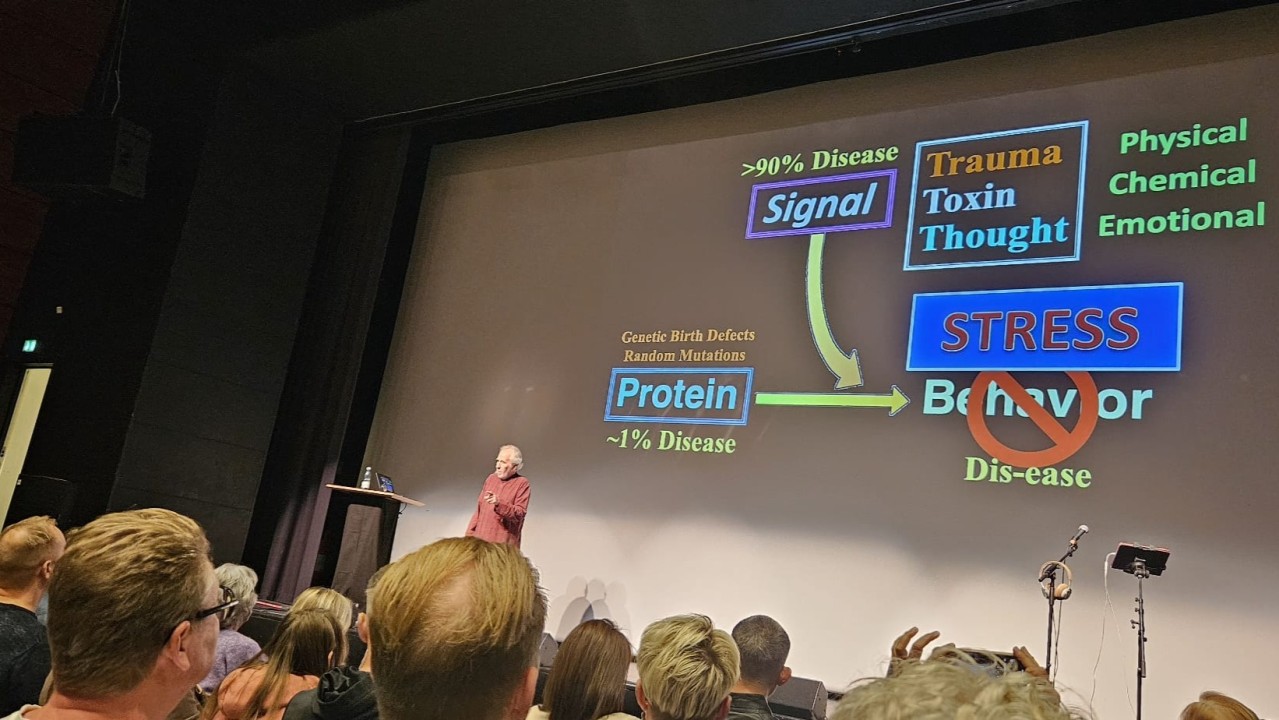
Stress.
We all experience it.
From the never-ending to-do lists to the pressures of balancing work and home life, stress has become an unwelcome companion in our modern lives.
But what if I told you that stress, not your genetics, is the biggest threat to your health?
I recently attended Bruce Lipton’s Healing Workshop in Copenhagen, where this reality hit home in a profound way.
Bruce shared a series of slides that made one thing crystal clear: our genes play only a small role in determining our health – it’s stress and the signals we send to our cells that have the biggest impact.
Let me explain why this is so important.
We often think of our genetics as a set-in-stone blueprint for our lives. We inherit traits from our parents, and that’s just the way things are, right?
Not quite.
What I learned from Bruce’s workshop is that less than 1% of diseases are caused by genetic defects. The other 99%?
That’s largely influenced by signals from our environment – and stress is one of the biggest culprits.
Bruce shared a powerful slide that showed how trauma, toxins, and thoughts all send signals to our cells. These signals create stress, which then impacts our behavior, shutting down our immune system, conscious mind, and even our blood supply to vital organs.
When stress takes over, our bodies aren’t functioning at their best, leading to what Bruce calls “dis-ease.”
Can you feel that? The tension in your shoulders? The tightness in your chest? That’s stress doing its damage.
During the workshop, Bruce presented the idea that stress doesn’t just affect our mood or mental state—it goes much deeper, into our biology. I couldn’t help but think of my own patients, many of whom have been struggling with conditions they believe are rooted in their genetics.
But after hearing Bruce speak, I realized that so much of what we experience is triggered by our response to stress.
Let’s take a moment to reflect on this: if stress signals can literally shut down parts of our body, what is it doing to our long-term health?
Bruce explained that chronic stress is the driver behind the majority of modern diseases, from heart conditions to autoimmune disorders.
The most eye-opening part for me was when he showed a slide from the American Psychological Association. It detailed how 75% to 90% of all physician office visits are for stress-related ailments and complaints.
Can you believe that?
We are bombarding our doctors with symptoms that are often caused by the very stress we allow to consume us.
At one point in the workshop, Bruce showed a slide that read:
“Stress shuts down your immune system, your conscious mind, and blood supply to your organs.”
Imagine that for a moment. When you’re stressed, your body is essentially in survival mode. It can’t heal, can’t think clearly, and can’t perform at its peak. And in the long run, this state of constant survival leads to disease.
We often talk about self-care and managing stress, but do we really understand just how crucial it is?
Most of us know that stress is “bad,” but few of us realize just how dangerous it can be for our health.
This workshop reminded me how essential it is to actively manage our stress, not just for our mental well-being, but for our physical health.
I want you to picture this: your body as a finely-tuned orchestra.
When stress hits, it’s like a chaotic conductor taking over, throwing the musicians off beat. Your immune system, digestion, and mental clarity—the most vital parts of your health—start to falter.
But here’s the good news: you have the power to take back control.
Bruce’s research and the slides he shared during the workshop gave me a renewed sense of empowerment, both for myself and for those I work with.
Stress may feel inevitable, but how we respond to it is within our control. By creating environments—internally and externally—that are nurturing rather than hostile, we send healing signals to our cells.
Instead of living in survival mode, we can create a space where health, healing, and balance thrive.
So how do we do this?
It starts with awareness.
Are you feeling overwhelmed at work? Constantly rushing from one task to another without a moment to breathe?
Stress doesn’t just impact your mood; it impacts your biology.
It’s time to slow down, to create space for calm, and to consciously direct your energy towards healing.
Here’s what I want you to do today: pause and check in with yourself.
What’s stressing you out? What can you let go of?
Remember, stress isn’t just an emotional state. It’s a signal that your body is absorbing, and if you’re not careful, it can lead to lasting damage.
I left Bruce Lipton’s workshop with a renewed commitment to protecting my health—and the health of my patients—by focusing on stress management as a core part of our wellness.
If stress is the silent saboteur of our health, then managing it is the key to unlocking our best selves.
Remember, your genes are not your destiny.
The signals you send your cells every day matter more than you think.
It’s time to take control of those signals and give your body the peace it deserves.
Warmly,
Florina
Get My Blog Posts Right in Your Inbox Every Week
Make your mental health a priority. Receive tips and strategies for living well – mentally, physically, and emotionally – every week.
Get My Free Guide: 7 Cheap, Simple Strategies for Boosting Your Brain Performance
Better focus – clearer memory – faster cognition – more mental clarity – improved intellect…
Your brain is capable of beautiful things. If you don’t think you’re getting the most out of your cranial supercomputer, you can reap the benefits of these 7 simple strategies for the low, low price of “free.”